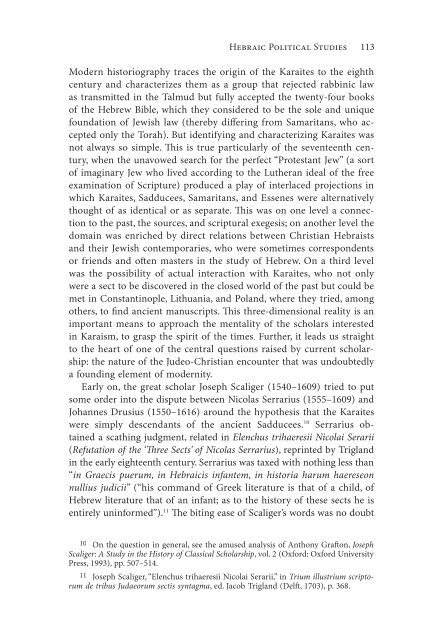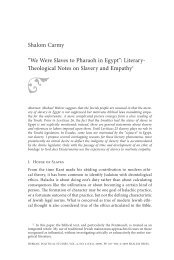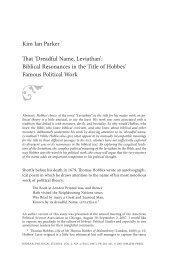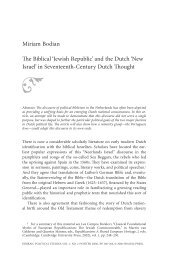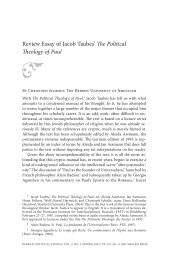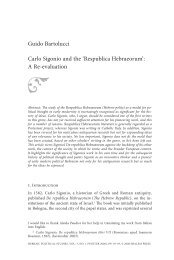download this article in pdf format - Hebraic Political Studies
download this article in pdf format - Hebraic Political Studies
download this article in pdf format - Hebraic Political Studies
Create successful ePaper yourself
Turn your PDF publications into a flip-book with our unique Google optimized e-Paper software.
HEBRAIC POLITICAL STUDIES 113<br />
Modern historiography traces the orig<strong>in</strong> of the Karaites to the eighth<br />
century and characterizes them as a group that rejected rabb<strong>in</strong>ic law<br />
as transmitted <strong>in</strong> the Talmud but fully accepted the twenty-four books<br />
of the Hebrew Bible, which they considered to be the sole and unique<br />
foundation of Jewish law (thereby differ<strong>in</strong>g from Samaritans, who accepted<br />
only the Torah). But identify<strong>in</strong>g and characteriz<strong>in</strong>g Karaites was<br />
not always so simple. is is true particularly of the seventeenth century,<br />
when the unavowed search for the perfect “Protestant Jew” (a sort<br />
of imag<strong>in</strong>ary Jew who lived accord<strong>in</strong>g to the Lutheran ideal of the free<br />
exam<strong>in</strong>ation of Scripture) produced a play of <strong>in</strong>terlaced projections <strong>in</strong><br />
which Karaites, Sadducees, Samaritans, and Essenes were alternatively<br />
thought of as identical or as separate. is was on one level a connection<br />
to the past, the sources, and scriptural exegesis; on another level the<br />
doma<strong>in</strong> was enriched by direct relations between Christian Hebraists<br />
and their Jewish contemporaries, who were sometimes correspondents<br />
or friends and oen masters <strong>in</strong> the study of Hebrew. On a third level<br />
was the possibility of actual <strong>in</strong>teraction with Karaites, who not only<br />
were a sect to be discovered <strong>in</strong> the closed world of the past but could be<br />
met <strong>in</strong> Constant<strong>in</strong>ople, Lithuania, and Poland, where they tried, among<br />
others, to f<strong>in</strong>d ancient manuscripts. is three-dimensional reality is an<br />
important means to approach the mentality of the scholars <strong>in</strong>terested<br />
<strong>in</strong> Karaism, to grasp the spirit of the times. Further, it leads us straight<br />
to the heart of one of the central questions raised by current scholarship:<br />
the nature of the Judeo-Christian encounter that was undoubtedly<br />
a found<strong>in</strong>g element of modernity.<br />
Early on, the great scholar Joseph Scaliger (1540–1609) tried to put<br />
some order <strong>in</strong>to the dispute between Nicolas Serrarius (1555–1609) and<br />
Johannes Drusius (1550–1616) around the hypothesis that the Karaites<br />
were simply descendants of the ancient Sadducees. 10 Serrarius obta<strong>in</strong>ed<br />
a scath<strong>in</strong>g judgment, related <strong>in</strong> Elenchus trihaeresii Nicolai Serarii<br />
(Refutation of the ‘ree Sects’ of Nicolas Serrarius<br />
), repr<strong>in</strong>ted by Trigland<br />
<strong>in</strong> the early eighteenth century. Serrarius was taxed with noth<strong>in</strong>g less than<br />
“<strong>in</strong> Graecis puerum, <strong>in</strong> <strong>Hebraic</strong>is <strong>in</strong>fantem, <strong>in</strong> historia harum haereseon<br />
nullius judicii” (“his command of Greek literature is that of a child, of<br />
Hebrew literature that of an <strong>in</strong>fant; as to the history of these sects he is<br />
entirely un<strong>in</strong>formed”). 11 e bit<strong>in</strong>g ease of Scaliger’s words was no doubt<br />
10 On the question <strong>in</strong> general, see the amused analysis of Anthony<br />
Graon, Joseph<br />
Scaliger: A Study <strong>in</strong> the History of Classical Scholarship, vol. 2 (Oxford: Oxford University<br />
Press, 1993), pp. 507–514.<br />
11 Joseph Scaliger, “Elenchus trihaeresii Nicolai Serarii,” <strong>in</strong> Trium illustrium scriptorum<br />
de tribus Judaeorum sectis syntagma, ed. Jacob Trigland (Del, 1703), p. 368.


